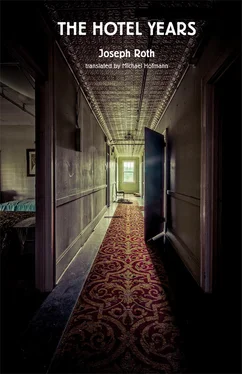Joseph Roth - The Hotel Years
Здесь есть возможность читать онлайн «Joseph Roth - The Hotel Years» весь текст электронной книги совершенно бесплатно (целиком полную версию без сокращений). В некоторых случаях можно слушать аудио, скачать через торрент в формате fb2 и присутствует краткое содержание. Год выпуска: 2015, Издательство: New Directions, Жанр: Прочая документальная литература, Прочая документальная литература, Культурология, Классическая проза, на английском языке. Описание произведения, (предисловие) а так же отзывы посетителей доступны на портале библиотеки ЛибКат.
- Название:The Hotel Years
- Автор:
- Издательство:New Directions
- Жанр:
- Год:2015
- ISBN:нет данных
- Рейтинг книги:3 / 5. Голосов: 1
-
Избранное:Добавить в избранное
- Отзывы:
-
Ваша оценка:
- 60
- 1
- 2
- 3
- 4
- 5
The Hotel Years: краткое содержание, описание и аннотация
Предлагаем к чтению аннотацию, описание, краткое содержание или предисловие (зависит от того, что написал сам автор книги «The Hotel Years»). Если вы не нашли необходимую информацию о книге — напишите в комментариях, мы постараемся отыскать её.
Frankfurter Zeitung
The Hotel Years — читать онлайн бесплатно полную книгу (весь текст) целиком
Ниже представлен текст книги, разбитый по страницам. Система сохранения места последней прочитанной страницы, позволяет с удобством читать онлайн бесплатно книгу «The Hotel Years», без необходимости каждый раз заново искать на чём Вы остановились. Поставьте закладку, и сможете в любой момент перейти на страницу, на которой закончили чтение.
Интервал:
Закладка:
I had never supposed that people’s decency was a match for their self-interest. But that their meanness was even greater than their curiosity, that was brought home to me by this incident, which shows that it isn’t difficult to strip the pillow off someone’s deathbed, and sell the feathers at the next street corner.
The woman who had escaped with her life now wept for the loss of her umbrella and was not at all grateful that her limbs were intact. As evidenced here, people come in two sorts: unscrupulous and plain dim.
Neue Berliner Zeitung—12 Uhr-Blatt, 29 May 1921
5. The Emigrants’ Ship
ON BOARD THE PITTSBURGH
The emigrants’ ship is called the Pittsburgh , and it is due to leave Bremerhaven at exactly 2 minutes past 11. The emigrants are people from the East, mainly Jews, lucky to have escaped the Europe of pogroms; also Russian peasants and young Ukrainian women, with colourful headscarves like summer meadows, sprinkled with cheery red and blue flowers. The White Star Line, which owns the Pittsburgh , has finally ended its rather anachronistic policy of “steerage passengers”, by abolishing the ’tween decks, and introducing third-class cabins. The proletarian romance of a chaos of people and suitcases is over. All are tucked away in tight cabins like lockable pigeonholes set in the walls. The Jews, children or bearded, the Russian peasants, their faces furrowed like their fields, and the shining Ukrainian peasant women are all boxed up. Their emigrant poverty hidden, no longer open to the shameless prying eye. Still, there is a good deal of misery on show before it is all packed away. The luggage — strange, eccentric-looking items, down pillows bagged up in hessian, coverlets, red and white striped privities, tied and endlessly retied bundles and baskets with antediluvian padlocks. Everything is loaded onto small wagons running on electric motors and taken to port. Even so, the emigrants are still carrying a lot. There are things a person doesn’t like to lose from sight, not even for half an hour. And so the Jews are left to sweat under their cherished loads which they lug on their crooked backs and in their frozen hands as far as the plump, helmeted policeman. This policeman is a splendid instance of a half-terrestrial, half-marine authority. His round cheeks are of a red that seems to glow from within, as if he had a lit candle in his mouth like a paper lantern at a summer fete. Ships’ cooks all look like that. The helmet, the dark cloak, and the sabre, none of them go with the salt water face. A great calm radiates from that broad, improbably luminous face, and a benevolence that denies the severity of the blinking badge on the helmet, and quite disavows the sabre. The policeman stands at the far end of the narrow bridge that connects terra firma to the great sea. The emigrants need to go past him with their heavy loads. Clumsily as can be, they set their loads down, looking for a clean spot; ideally they would spread one of their red and blue check handkerchiefs on the ground before setting their bundle down on top of it. All that takes a good five minutes, and already a gong is being sounded on board: in ten minutes the Washington is due, and so the Pittsburgh will have to leave its berth. But the policeman radiates the calm and ease of a traffic light; they look at him, and think they have all the time in the world, whatever the urgency of the ship. They produce passports and tickets sewn into undershirts or variously secreted about their bodies. The policeman, by the light of his own countenance, studies them assiduously.
The ship (it has a tonnage of 16,000) carries 1,800 passengers. About a third of these are emigrants. They come from Russia and the Successor states, Poland and Lithuania. The East of Europe pours them out. These Eastern Jews and peasants have been emigrating westwards for hundreds of years, leaving their old homes behind, looking for a new one. A great sadness emanates from them, their grey beards, their wrinkled faces, their adorable, helpless bundles. A family from Kowel is here, an old matron swaddled in black, two young daughters with cropped curls, and a twenty-year-old son, with broad shoulders and red hands dangling from his sleeves like giant appliances. He laughs and shrugs his strong shoulders. For two years now he and his family have been wandering through the sorry, moribund West of Europe, in search of his father, who left Kovel ten years before — God only knows where he is. They were in Budapest, six months in constant dread of the expatriation that might come at any hour of day or night; finally it came and they were chased to Vienna, where they hung on for a year in a basement hole on Kleine Schiffergasse. Here too they were viewed as a burden on the state — the son engaged in unauthorized selling of clothes — and they drifted on to the wretched east of Berlin, to Hirtenstrasse, where the black market promises undreamed-of riches and doesn’t deliver. Finally a cousin got in touch from New York, a street vendor of oranges and lemons and he sent them steamer tickets and ten dollars apiece — God helps those who are abandoned. Now they are on their way to America and a vast, beautiful freedom beckons to the children, a grave to their old mother, but they will have got away from Europe, the continent of pogroms, of the police, the black market and unauthorized dealing in second-hand clothes. The Ukrainian peasants are fleeing hunger, the plague, and a creeping charity. One has a brother-in-law there — Nikita is his name — another has a nephew, Timofei. The barely legible addresses are scribbled on old crumpled envelopes. For many weeks the peasants have been carrying them tucked into waistcoat pockets, in snuff boxes, and in carved pipe bowls of cherry wood. The peasants’ wives have the timid, flickering eyes of frightened animals as they watch the bustle, great ships’ cranes taking up huge quantities of coals, slowly swiveling in mid-air, the scoops opening like giant hands, and spilling their load into the hold. They hear the unfamiliar clang of the heavy ship’s bell, the warning cries of the dockers, the thunder or clatter of the rolling trucks. They see how the harbour goes on and on, offering the illimitable ocean to the eye, a never-before-seen endlessness of blue.
Way up in the air the Stars and Stripes flutter over the international shipping banner, which is as blue as the sky and the sea, and with a white circle in the middle, like a perfectly regular cloud. On the bridge stands a man with his cap strapped over chin and ears, giving out orders in incomprehensible terms. His commands are as mysterious as the great sea itself. A little tug tows the ship with thick hawsers; like a willing triumphal gate the harbour locks slowly and ceremonially open. The emigrants are on board; they call out to the disappearing land. No one has come to see them off, so they wave to strangers, to the luminous policeman, to the dockers and porters. Up at the rim of a huge chimney appears a black figure, a chimneysweep, a toy figure compared to the enormous liner, so tiny is his silhouette against the endless blue background. Out of the perfectly round windows of their cabins the emigrants’ faces catch their last sight of Europe.
Prager Tagblatt, 18 February 1923
6. The Currency-Reformed City
The only affordable currency-reformed city in Germany is Hamburg. It has introduced its own currency, the much-praised, much-sought-after Hamburg Gold Mark, which sells at a premium on the black market. I have seen one for myself, a Hamburg Gold Mark, it’s a little scrap of paper that proclaims that the Hamburg banks will vouch for its full convertibility. And as people know the world over, Hamburg banks are solid and reliable, and so Hamburg has become the cheapest, most affordable city in Germany.
Читать дальшеИнтервал:
Закладка:
Похожие книги на «The Hotel Years»
Представляем Вашему вниманию похожие книги на «The Hotel Years» списком для выбора. Мы отобрали схожую по названию и смыслу литературу в надежде предоставить читателям больше вариантов отыскать новые, интересные, ещё непрочитанные произведения.
Обсуждение, отзывы о книге «The Hotel Years» и просто собственные мнения читателей. Оставьте ваши комментарии, напишите, что Вы думаете о произведении, его смысле или главных героях. Укажите что конкретно понравилось, а что нет, и почему Вы так считаете.












